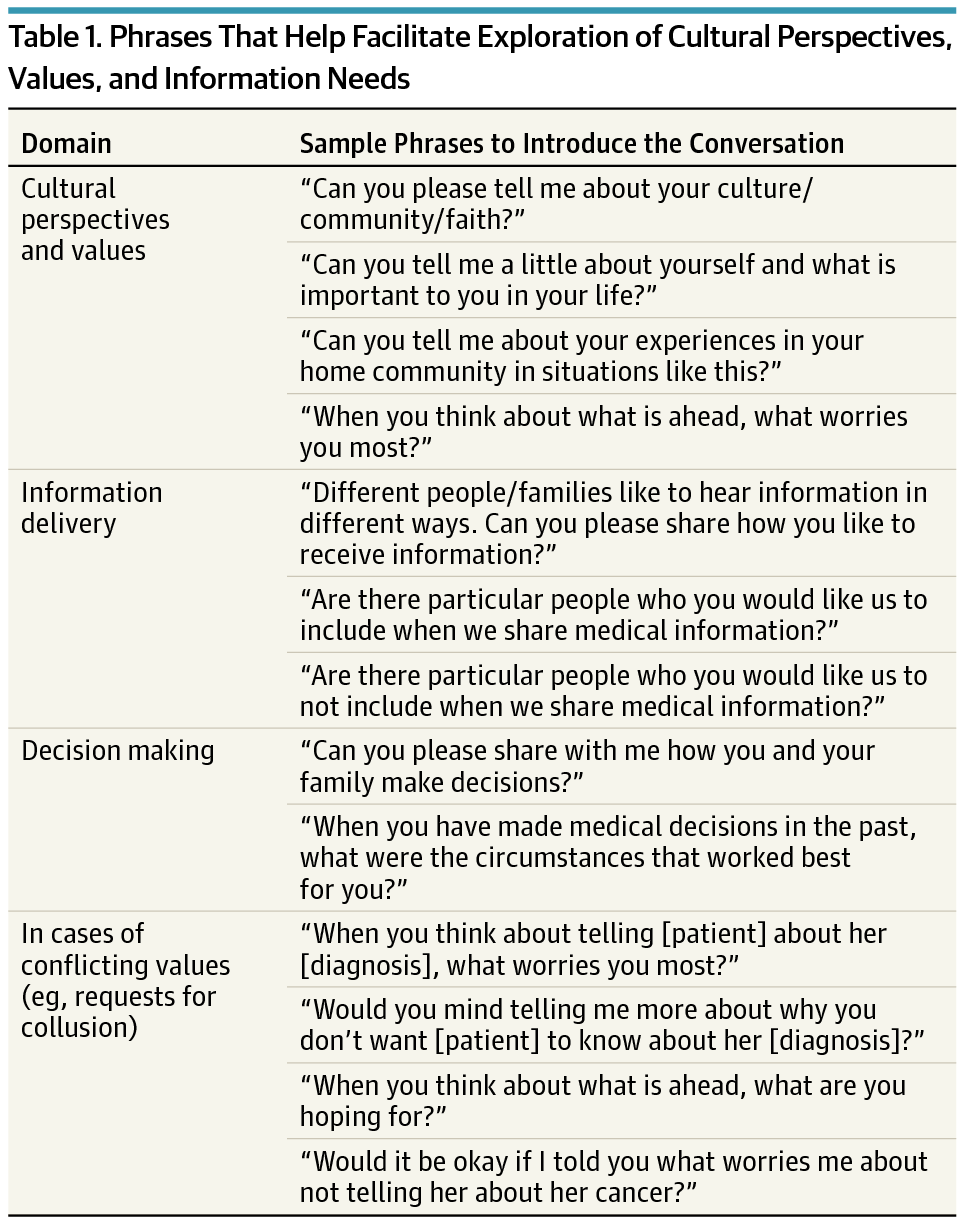JAMA Pediatrics ( IF 24.7 ) Pub Date : 2017-11-01 , DOI: 10.1001/jamapediatrics.2017.2568 Abby R. Rosenberg 1 , Helene Starks 2 , Yoram Unguru 3 , Chris Feudtner 4 , Douglas Diekema 2

|
Importance Navigating requests from parents or family caregivers not to disclose poor prognosis to seriously ill children can be challenging, especially when the requests seem culturally mediated. Pediatric clinicians must balance obligations to respect individual patient autonomy, professional truth telling, and tolerance of multicultural values.
Observations To provide suggestions for respectful and ethically appropriate responses to nondisclosure requests, we used a hypothetical case example of a Middle Eastern adolescent patient with incurable cancer and conducted an ethical analysis incorporating (1) evidence from both Western and Middle Eastern medical literature and (2) theories of cultural relativism and justice. While Western medical literature tends to prioritize patient autonomy and corresponding truth telling, the weight of evidence from the Middle East suggests high variability between and within individual countries, patient-physician relationships, and families regarding truth-telling practices and preferences. A common reason for nondisclosure in both populations is protecting the child from distressing information. Cultural relativism fosters tolerance of diverse beliefs and behaviors by forbidding judgment on foreign societal codes of conduct. It does not justify assumptions that all individuals within a single culture share the same values, nor does it demand that clinicians sacrifice their own codes of conduct out of cultural respect. We suggest some phrases that may help clinicians explore motivations behind nondisclosure requests and gently confront conflict in order to serve the patient’s best interest.
Conclusions and Relevance It is sometimes ethically permissible to defer to family values regarding nondisclosure, but such deferral is not unique to cultural differences. Early setting of expectations and boundaries, as well as ongoing exploration of family and health care professional concerns, may mitigate conflict.
中文翻译:

文化差异和不可治愈的小儿疾病背景下的实话实说研究述评
重要性 要求父母或家庭看护人要求不要透露重病儿童的预后很困难,尤其是当这些要求似乎是出于文化原因时。儿科临床医生必须权衡义务,以尊重患者的自主权,专业的实话实说和对多元文化价值观的容忍度。
观察结果 为了提供尊重和符合伦理的对未披露要求做出回应的建议,我们使用了一名中东顽固性癌症青少年患者的假设案例,并进行了伦理分析,其中包括(1)西方和中东医学文献中的证据以及(2)文化相对论和正义理论。尽管西方医学文献倾向于优先考虑患者的自主权和相应的真相讲述,但中东地区的大量证据表明,各个国家之间,患者与医师之间的关系以及家庭之间在讲述真相的做法和偏好方面存在很大差异。在这两个人群中不公开的一个普遍原因是保护孩子免受令人痛苦的信息的伤害。文化相对主义通过禁止对外国社会行为准则的判断来培养对各种信仰和行为的宽容。它并不能证明一种单一文化中所有个体都具有相同价值的假设是合理的,也没有要求临床医生出于文化方面的考虑而牺牲自己的行为准则。我们建议一些短语,这些短语可以帮助临床医生探索不公开请求背后的动机,并轻轻地面对冲突,以便为患者的最大利益服务。
结论和相关性 在伦理上,有时可以遵循不公开的家庭价值观,但是这种推迟并非文化差异所独有。尽早设定期望和界限,以及不断探索家庭和医疗保健专业人员的关注点,可能会减轻冲突。











































 京公网安备 11010802027423号
京公网安备 11010802027423号